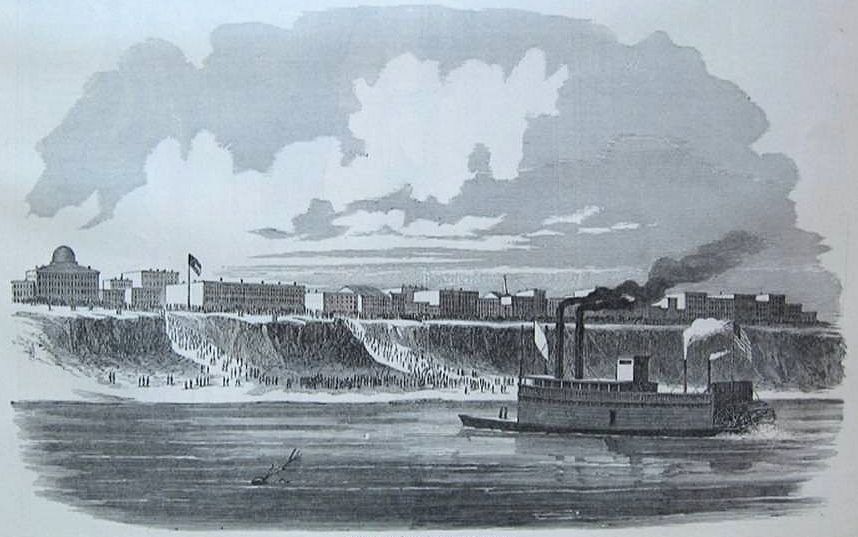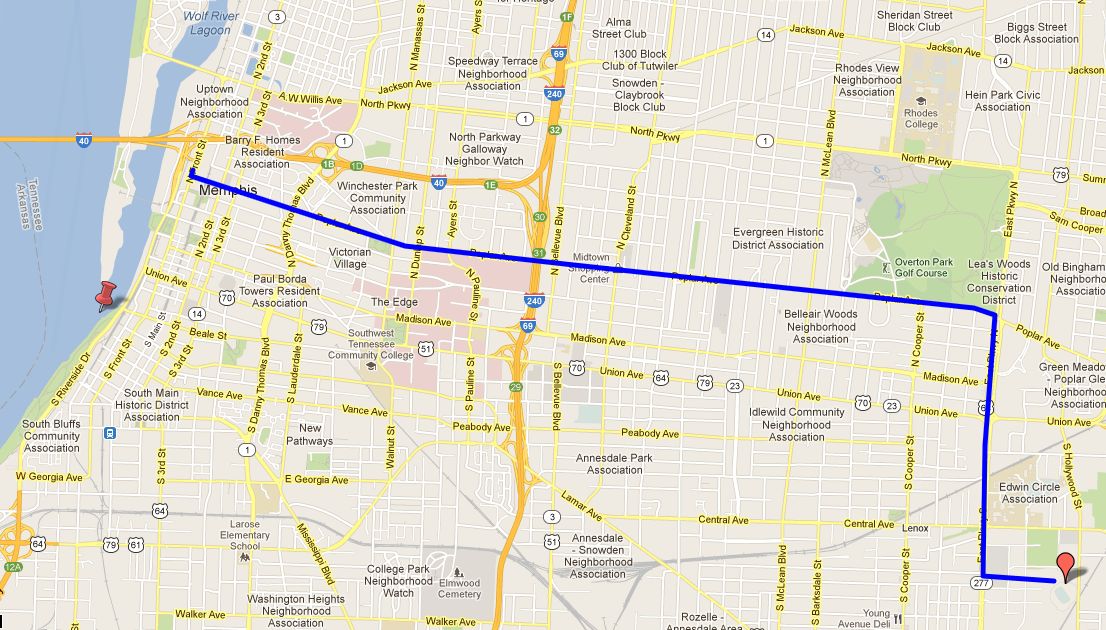| Previous Date | Day By Day Index | 16th OVI Home Page | Next Date |
Where was the regiment on
Thursday, November 27, 1862
On this day the the soldiers of the 16th Ohio and the rest of DeCourcey's brigade, having slept aboard their steamboats anchored in the Mississippi River in front of Memphis, disembarked and set up camp one mile east of the city. The name of the camp, considered very nice by Pvt. Peter Perrine, Co. C, was Camp Oliver. The regiment would stay here 23 days while Gen. Sherman prepared his army for a move against Vicksburg, Mississippi, the Confederate stronghold on the lower Mississippi River. Cpl. Theodore Wolbach tells us:
The weather was mild and the boys felt cheerful. With martial music and in splendid order we marched out through the city on Poplar street, and stacked arms near the fair ground, at the eastern limits of the place. Not having any teams to haul our camp equipage up from the boats, details of men were sent back to carry it up.
After having been on the boat twelve days and riding nine hundred and eight-two miles, the boys felt like being released to freedom.
All over Memphis, on every street, were soldiers, skipping around, constantly on the move, on perfectly good terms with one another.
A part of the tents were pitched the evening we arrived, the balance in the morning.
* Information and italicized quotations, above, from a series of articles entitled Camp and Field - The Old 16th Ohio,, written in the 1880s by Theodore Wolbach, late Corporal in Company E, 16th Ohio Volunteer Infantry.
Private Frank Mason, Company A, 42nd OVI (the 16th's sister regiment), also describes their arrival in Memphis:
Finally, on the night of the 26th, the steamer reached Memphis, and the next morning we found our boat anchored out in the river in front of the city. A high, bluff bank rose from the shore, pierced at two or three places with steep roads or paved streets, which ran down to the levee, to which wharf boats were moored as we had seen them in Cincinnati. Two iron-clad gunboats, low, dark, mysterious-looking crafts, were anchored near us; and as they had already become famous through the part which they had played at Fort Donelson and Island No. 10, we surveyed them with great interest. During the day, we received the welcome order to make preparations for going ashore. The boat swung up to the wharf, and the Forty-Second, putting its best foot foremost, marched up the levee and through Memphis to a beautiful camping ground a mile or two in the rear of the city. It was the first real city that the Regiment had marched through for many a weary month, and the sight of the handsome buildings, the busy, well-dressed crowds, and the evidences of comforts and luxuries to which we had so long been strangers, made the day's experience a novel and fascinating one. Our camp ground was a beautiful plain, with oak trees scattered here and there, and afforded ample facilities for systematic camp life and drill. It had been formerly a fair ground and race course, then for a long time a Confederate camp of instruction, and before we reached it had been so thoroughly stripped of fences and everything that would burn or aid in the construction of a soldier's hut, that it resembled a city lawn or the carefully-kept meadow of an English farm. With only the vaguest idea of what it had come to Memphis for, the Forty-Second went into camp with the hope that this was to be its home for the winter. Although nearly the first of December, the weather was warm, bright and balmy, like the earlier days of October at home. That we should be permitted, after all our rough service, to have one winter of city duty, seemed too good to be true, and we yet clung to the hope until delusion was no longer possible.
But we could not long deceive ourselves. There was nothing about us to indicate a quiet or settled condition of things. The city was full of soldiers; away to the South of us two divisions of troops were encamped. They had just returned from an expedition to Corinth and Holly Springs and beyond, and their wagons and gun-carriages splashed with mud, their poor, worn horses and travel-stained appearance confirmed the report of hard marching and rough service. They had been under Grant, they said, and had suddenly been turned back and hurried to Memphis, which as we could plainly see and feel, was the gathering ground of a powerful expedition.
* Information and italicized text, above, taken from The Forty-Second Ohio Infantry - A History of the Organization and Services of That Regiment In the War of the Rebellion, 1876 - F. H. Mason, late Private of Company A - Cobb, Andrews & Co., Publishers.

Sketch of Memphis, Tennessee, riverfront during Civil War
Note "roads" cut into bluffs as described by Pvt. Frank Mason, above
Modern day map of the route along Poplar Street in Memphis, Tennessee, where the 16th Ohio and other troops marched and stayed 23 days in Camp Oliver, located on the Memphis fairgrounds and racetrack:
Red pin - Memphis Fairgrounds (later Mid South Fairgrounds & Montgomery Racetrack)

| Previous Date | Day By Day Index | 16th OVI Home Page | Next Date |